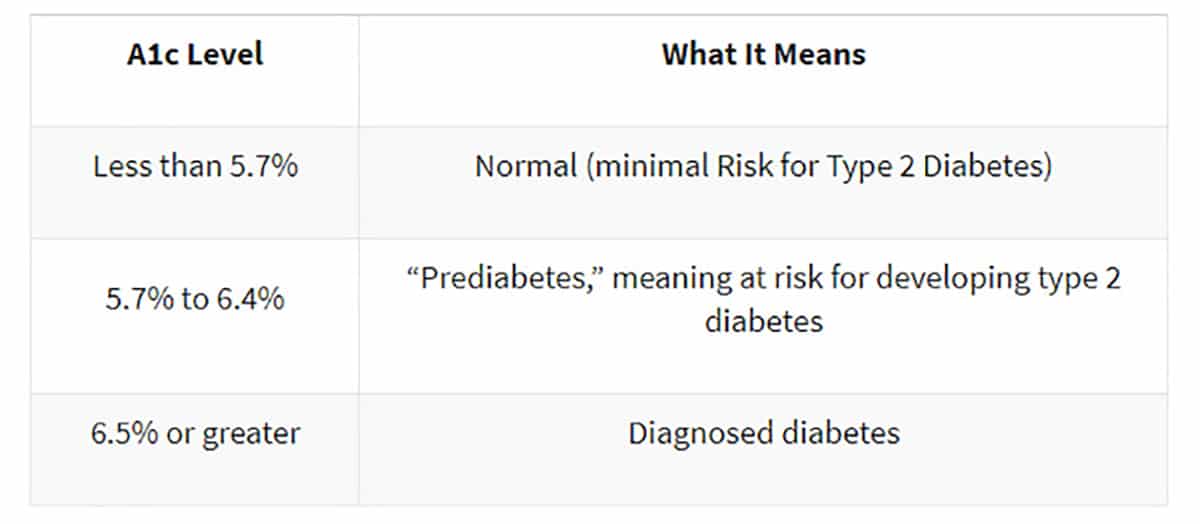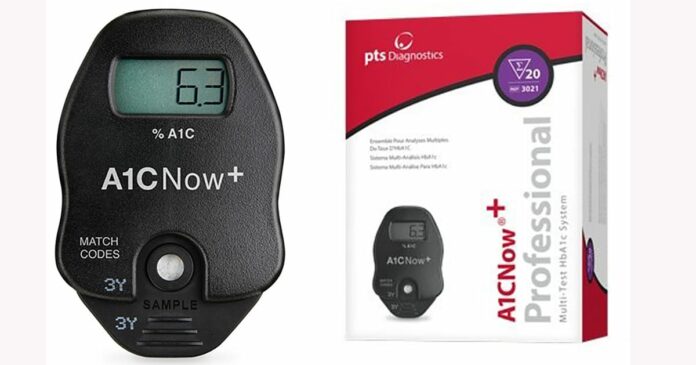The A1C or Hemoglobin A1C test is something everyone living with diabetes should be familiar with.
It doesn’t show the whole picture of your diabetes management, but it can be a great indicator of whether your average blood sugar levels are within a healthy range.
Today, I’ll show you how to easily and accurately measure your A1C at home.
We’ll also discuss what an A1C test actually tells you, why it’s a relevant test, and how to interpret the results.
What is an A1C test
The A1C test is a blood test that reflects your average blood glucose over the last 3 months. It is reported as a percentage and people who don’t live with diabetes generally have an A1C below 5.7%.
That means that an A1C test can be a good starting point for a diabetes diagnosis as well as an indicator of whether your diabetes management approach is successful.
The American Diabetes Association has established the following A1C guidelines for using the test as part of a diabetes diagnosis:


A1C targets for people living with diabetes should be tailored to the individual, but generally, an A1C of 7% or lower is recommended. An A1C of 7% translates to an average blood sugar of around 154 mg/dl (8.6 mmol/L).
Some people living with diabetes strive for A1C levels below 5.7%, but aiming for a very low A1C is not always advisable, especially if it’s achieved through an excessive amount of hypoglycemia (low blood sugar).
Discuss your target A1C with your doctor and remember that it can always be adjusted up or down depending on what’s appropriate for you.
Why is it important to measure your A1C
Since elevated blood sugars can lead to a number of short- and long-term complications, it’s advisable to keep an eye on your A1C and ensure that it’s held at a healthy level.
If you find that your blood sugars (and thereby your A1C) are increasing above your target, there are several things you can do to reduce them, such as discussing adjusting your medication with your doctor, changing your diet, and making lifestyle changes
You can read our complete guide to lowering your A1C for more information.
Since the A1C tests give you a picture of your blood sugar level for the last 3 months, it makes sense to have your A1C measured at least every 3 months to keep track of how your blood sugars are progressing.
It the test is used for a diabetes diagnosis, you might have to also have your fasting blood sugar and antibody levels measured to determine which type of diabetes you live with, such as type 1 or type 2 diabetes.
How to use the A1C home test kit
There can be many reasons to measure your A1C at home, such as limited access to see your doctor, the distance to a lab, the cost of the lab work, etc.
There are great options for measuring your A1C at home, but please consult with your medical team before making any changes to your care or self-diagnosing diabetes.
One very affordable A1C home test kit is the A1CNow SelfCheck which I demonstrate how to use in the video below.
The kit comes with 4 A1C tests and will give you your A1C result in only 5 minutes. Follow the instructions that come with the kit and make sure to add enough blood or it will return an error message.
Are home A1C test kits accurate?
Most home A1C kits are considered to be as accurate as lab A1C tests. The results are accurate within plus/minus 0.5 percentage points, which is about the same as most lab results.
To ensure accuracy, look for products that are NGSP-certified (National Glycohemoglobin Standardization Program) and/or have FDA clearance or CE mark. All the products mentioned in this article are NGSP-certified.
When I tried the A1CNow SelfCheck at home (see the video above), the A1C results came back with exactly the same result as the A1C lab test I had done a few days earlier (I used Quest Diagnostics for the lab test).
How much does an A1C test kit cost?
The A1CNow SelfCheck I used in the video is $53.83 on Amazon (as of September 2020) for 4 tests. I chose this kit as it was the cheapest solution, but similar home A1C kits can be found on Amazon ranging from $60-$100 for 4 tests.
You can also find home A1C kits in most pharmacies such as CVS and Walmart.
A1C kits that require you to collect a blood sample at home and send it to a lab are also available.
These tests require a significantly larger blood collection (4-5 large droplets) and you can end up waiting up to 4 weeks (like I did when I tried it out) for your test results, depending on how fast the mail gets to the lab and back to you.
Is it covered by insurance?
Whereas most health insurances (private and government plans) cover blood work prescribed by your doctor and performed in a lab, it’s doubtful that your insurance will cover an at-home A1C test unless it’s a prescribed kit.
However, you can always call your insurance company or look up your benefits and find out if your plans cover at-home kits. If it does, your insurance company may have a preferred brand or specific process for you to get your kit.

